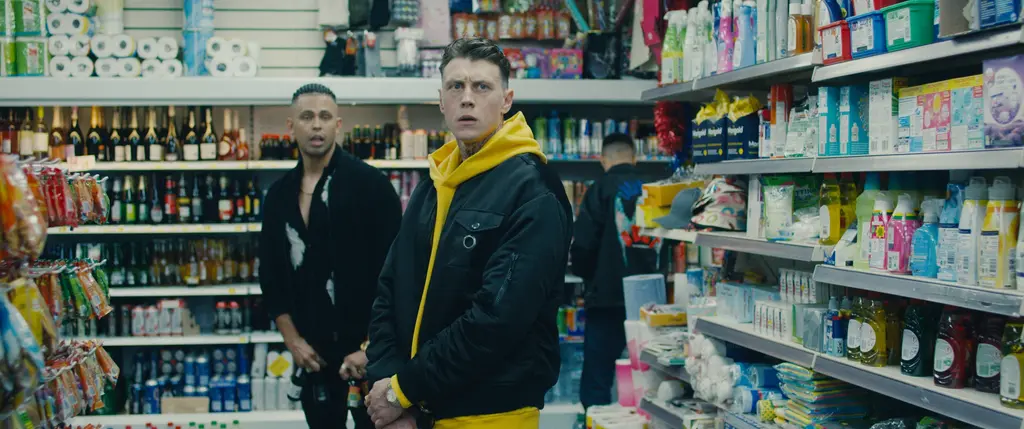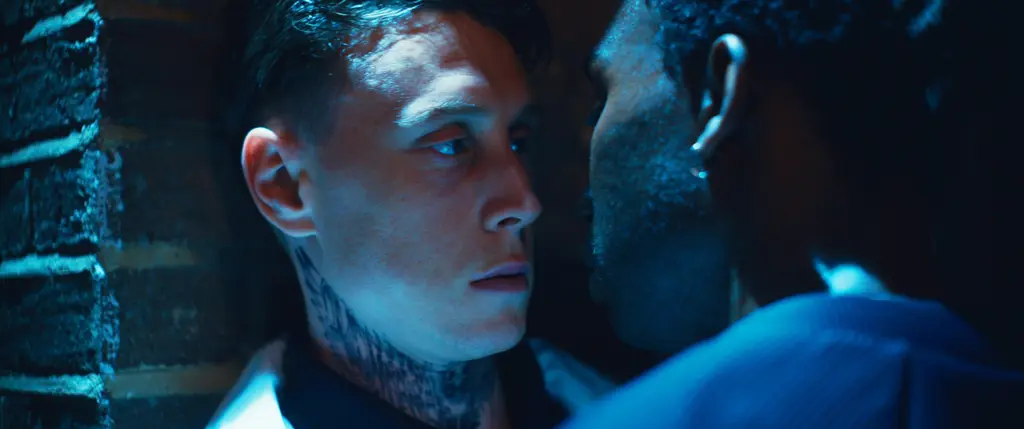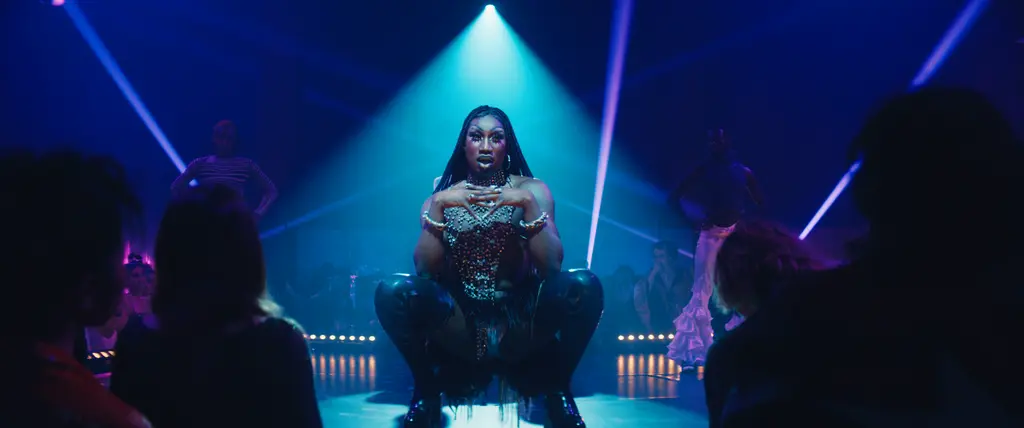The twisted queer thriller that uses sex as a weapon

Femme (noun): “an LGBTQ+ person whose gender expression is considered to be feminine”. Femme (film): a brilliant, brutal British story of a drag queen’s thirst for revenge. We speak to stars Nathan Stewart-Jarrett and George Mackay.
Culture
Words: Craig McLean
“Hey, hey, is that a bloke? That’s fucked up. Fucking f*ggots, man.”
“Takes one to know one, innit.”
And we’re off. From its opening minutes, Femme pulls no punches, and conceals none, either.
In the visceral, high-wire British thriller by queer filmmakers Sam H. Freeman and Ng Choon Ping, Jules, played by Nathan Stewart-Jarrett (E4’s Misfits) is drag queen Aphrodite: an out and proud performer who’s the toast of the East London drag scene. Preston, played by George Mackay (1917, True History of the Kelly Gang), is a streetwear-loving, tatted-up gym bro and aroadman.
Their first interaction: Preston loitering outside the club where Aphrodite is performing, checking out the star attraction as Jules has a pre-gig smoke.
They next meet in the shop around the corner. Jules is buying more ciggies, Preston and his boys are scooping up booze. Preston pre-emptively sneers at the “fucked up bloke” in a pink mini-skirt at the till, Jules witheringly claps back.
Moments later, outside the shop: Preston beats up the “man-woman [who] humiliated” him as his boys whoop and holler and film the assault. Then he deepens his sadistic, homophobic assault by making Jules, at knifepoint, remove his drag and strip naked.
So far, so brutal.


But then Femme gets even more dark and twisty. Three months later, Jules sees his attacker in a gay sauna. Preston doesn’t recognise his victim. Before long, they’re naked in Preston’s bed.
Jules hatches a plot for sex-sting revenge on the deeply closeted thug. He enmeshes Preston in a relationship that’s as thrilling as it’s transgressive as it’s motivated by a deeply traumatised queer man’s raging desire for retribution and reclaimed agency. Devoid of his drag, Jules code-switches, flexing his skills at Street Fighter and embedding himself in his attacker’s toxically masculine world. Absent of his mates and engaging in frankly pounding sex with Jules, Preston wrestles with his true self and a public image that’s also performative but, terrifyingly, psychopathic.
As the filmmakers put it: “In our film, drag starts as a plot device for going undercover to pursue revenge, but becomes an exploration of how we’re all in different kinds of drag to feel powerful, to fit in, to hide truths that are too painful for the light of day. Jules begins with feminine drag – the kind of genderfucking that gives him power in queer world. Preston puts on masculine drag, the kind of status quo-reinforcement that gives him power in his homophobic milieu.”
“Probably any Black person in the western world understands a code-switch. You always have to regulate who you are in a particular space at a certain time”
NATHAN STEWART-JARRETT
Femme, then, is a lot. And it’s a huge ask for the two actors who drive almost every scene, many of them studded with violence, sex – often at the same time – and the intense tension of an elegantly shot, lean, tough, neo-noir thriller. It’s also brilliant, provocative and thoughtful, an artful expansion of the filmmakers’ original, 18-minute “proof of concept”. That short film starred Paapa Essiedu in the Jules role and Harris Dickinson as the Preston character. It premiered at SXSW in Austin, Texas and won Best British Short at the 2021 British Independent Film Awards.
It was precisely that pedigree and precision that attracted the feature-length project’s leading men. Stewart-Jarrett read the script, watched the short and thought, “fucking hell, I need to be in this,” he says. “The script was so tight and clean and conflicted. And when I met the directors, I was so enthused.”
Certainly the South Londoner could relate to the code-switching that Jules’ journey necessitates. “Where I grew up, people were getting mugged, stabbed… So you had to walk in a certain way, do certain things. Even now I’m very aware of what goes on, on a street. Also, probably any Black person in the western world understands a code-switch. You always have to regulate who you are in a particular space at a certain time. I don’t want to say it’s universal, but it feels pretty universal.”
In the specific terms of the Femme script, “I was just taken by the story and character,” Stewart-Jarrett continues. “I felt there was an intensity with our scenes, the connection, our journey. It was very much a duel between these two people. They were entwined, it was a dance, and George and I were in it together.”

Mackay echoes his co-star’s sentiments. “It’s a chess game. It’s a spark [between them],” says the West Londoner. Did the weight of the film’s narrative and Preston’s sadistic personality impact the actor’s approach at all? “In terms of the pressure, there’s nerves with every job. But with this, the characters are so great, the script is so well-written, you wanna do it, because it’s tough, meaty, nuanced. All that stuff that brings pressure is fuel. You wanna go at it.”
And, boy, do they go at it – in bed, in the car, against walls, against trees. But none of it feels gratuitous. On screen, at least.
Stewart-Jarrett: “There was one gratuitous moment…”
Mackay: “The sauna…”
Sitting side by side in the bar of the Royal Festival Hall on London’s South Bank, the pair look at each other and immediately collapse into laughter.
“It’s [a scene in] one of the montages,” explains Mackay. “We had four minutes at the end of the day, so we did three minutes and 59 seconds of just us [pretend] fucking – bam bam bam!”
“We just heard, ‘more more more!’” says Stewart-Jarrett. “And my head was actually banging on the door!”
“And I think I was saying some horrible stuff as well…”
“You were saying really, really dark dark shit! And they were actually shouting ‘stop stop stop!’, not ‘more more more!’ But we were inside the sauna and couldn’t hear anything.”
“Queer cinema is often about quiet drama. We wanted to tell stories of queer protagonists who exact revenge, do dangerous, reckless things, and be rewarded at the end with a same-sex/gender-fluid kiss”
SAM H. FREEMAN AND NG CHOON PING
The pair insist, though, that going hard was necessary. But equally important were authenticity and mutual respect between the actors.
“Because so much of the storytelling is told via their sexual relationship,” says Mackay, “it was all meticulously pieced out.” So, of course, there was an intimacy coordinator onset, and a stunt coordinator, too. Sometimes, those roles overlapped.
Trained doubles stepped in for a clattering fall down a flight of stairs, but mostly the actors did their own stunts. Talking of a pivotal fight scene, Mackay characterises it as “a microcosm of the whole film – we completely went for it, but also completely felt safe.”
Still, at one point their entwined bodies wrecked a table and Mackay “copped an elbow, big time. I thought I’d broken my nose.”
“I heard the crack,” says Stewart-Jarrett, wincing apologetically.
“And actually, in the fight scene, if you watch it for a second time, it almost [charts] the journey of their sexual relationship,” Mackay points out. “Every position they take in that wrestling match is the yang to the ying of their sex.”
All of this worked because the actors trusted each other. They had to. Given the writer-directors’ goals, and the importance of the story they were all telling, nothing about Femme could be half-arsed.
“The thriller genre is almost exclusively heteronormative,” say Freeman and Ping in a joint quote. “And the genre is a space where we have not really seen much evidence of queer agency. We suppose this is our way of counter-colonising the mainstream.
“Queer cinema is often about quiet drama; queer stories are so often about coming out, or victimhood, or socialising our way into acceptance. We wanted to tell other stories, of queer protagonists who exact revenge, do dangerous, reckless things, run through burning buildings, battle alien overlords to save the multiverse, and be rewarded at the end with a same-sex/gender-fluid kiss for it.”


We’ve caught Stewart-Jarrett, 37, and Mackay, 31 during a rare moment when they’re actually in the same place. The former has lived in America (LA first and now NYC) for seven years and is only back briefly; the latter is off to Cornwall tomorrow.
Both are busy with life and work. When we speak, Stewart-Jarrett is about to appear on TV screens in Culprits, the high-octane Disney+ thriller series he can’t talk about due to the American actors’ union strike that, at the time of our conversation, is ongoing. Mackay, on the other hand, has been shooting French-Canadian sci-fi romance The Beast (alongside Léa Seydoux), and being a full-time dad to his two young children while his film make-up artist partner works on a production.
Those respective obligations, ironically, put the two stars at cross-purposes when it came to preparing to shoot Femme over six weeks in East London last summer.
“My biggest concern was being scary enough,” admits Mackay. “A huge part was building Preston aesthetically.” That meant tattoos, clothes “and putting on the muscle, and feeling that. It was the same thing with …Kelly Gang. There’s something fundamental about feeling strong and knowing that you can beat someone in a fight.”
Unfortunately, at the time Mackay was a shadow of his former self. “I’d just [started] a family, so I was not doing any gym stuff. I didn’t look like Preston at all,” he says, smiling. “But I wanted to rise to the challenge – especially as that was a big thing the directors specified, that [physical] dynamic between us. Also, Nathan had come off a job and he was really strong.”
“I had to shed this [musculature] that I’d put on for eight months, and George had to grow it. And it’s so weird, the parallels within the film, characters having to put layers on [and take layers off]”
NATHAN STEWART-JARRETT
“I was huge!” Stewart-Jarrett says almost guiltily. His role in Culprits – a London gangland thief trying to live a new life in America – meant that, whereas Mackay had to bulk up, he had to skinny down.
“It was an inversion. Julie Harkin, who’s my fairy godmother,” he says of the Femme casting director who also cast him in Channel 4’s Utopia (2013), “saw I had a cardigan on and she was like: ‘I know what’s fucking underneath there! Lose weight!’” laughs Stewart-Jarrett. “I had to shed this [musculature] that I’d put on for eight months, and George had to grow it. And it’s so weird, the parallels within the film, characters having to put layers on [and take layers off].”
Not only that, but Stewart-Jarrett also had to dust off his drag moves.
“I’d seen some [drag performances] before for research for a play I did ages ago,” he says of Angels in America, the Tony- and Olivier-winning play in which he played a former drag queen. “But I was really keen to not to play a derivative of it. So I thought, let’s go back to the source. Let’s look at musicians like Nicki Minaj, [computer game] stuff like [Street Fighter character] Chun-Li, the bodybuilder Lisa Lyon, the original divas… Because drag really is about taking apart bits of pop culture that one likes and then adapting it into something of your own. And I needed to find a way to do that for myself, rather than looking at an [established] drag performer.”
He also needed “a lot of different things for the two drag performances” that book-end the film. “Jules is Aphrodite in both, but they’re different versions of Aphrodite, so I wanted to find different body languages and costumes.” Those versions, too, were part of the multi-faceted nature of the character. “The moral ambiguity of what Jules does was one of the reasons I was so excited about the film – he’s, like, five people in the story, and they’re all him, and I get to explore them all.”

As for his exploration of Preston’s background and emotional makeup, Mackay “didn’t want it to be shallow or an obvious representation of his sexuality, nor a [caricature] of those people pretending to be roadmen,” he says. “There are a lot of posh boys acting up to that. I wanted there to be an old school working class thing about him. That’s why he clashes with his sexuality.
“We talked about where his family would have been from,” he adds. “He’s a bit of a magpie, so he’s from not quite Essex way but definitely beyond where East London is trendy. Then he moved into London and that world, cherry-picked the roadman thing. But he’s also very fashion conscious – he’s got a love for streetwear. So the directors put me onto streetwear fashion blogs, because he’s on it in terms of what’s right and what’s wrong in terms of cool. I reckon he’d read THE FACE! The one uncool thing is Preston just does it too hard.”
That attention to detail, the emotional rigour, those complex, competing moral layers – not to mention the leading men’s all-in, all-powerful performances – combine to make Femme a stunning, taut-with-tension and, at times, difficult watch. Freeman and Ping, it seems, would be happy with that summation.
“Femme could be seen as an unlikely, uncomfortable love story that emerges from the revenge thriller,” they say. “Because the revenge is essentially Jules’s weaponisation of sex to seduce Preston into a place of emotional vulnerability. Each ‘romantic’ beat is also inseparably a revenge beat – a complete melding of the two genres.”
So, that was the filmmakers’ goal. What do the actors want audiences to get from watching Femme?
“When you leave the cinema, you should be buzzing and talking,” says Nathan Stewart-Jarrett. “That’s what I love. I don’t want apathy. I want people to actually talk about this film, for it to spur something. And be entertaining. It’s confronting, yes. But it’s a movie, not an essay or a talk. It’s very energetic, so I’d like it to feel energising.”
“We want a conversation to be started,” concludes George Mackay. “But also, we wanna excite people in the cinema. It’s a wild thriller. It’s sharp, it’s fast, it’s brutal enjoyment. We want it to be a ride. No pun intended.”
Femme is released on 1st December





